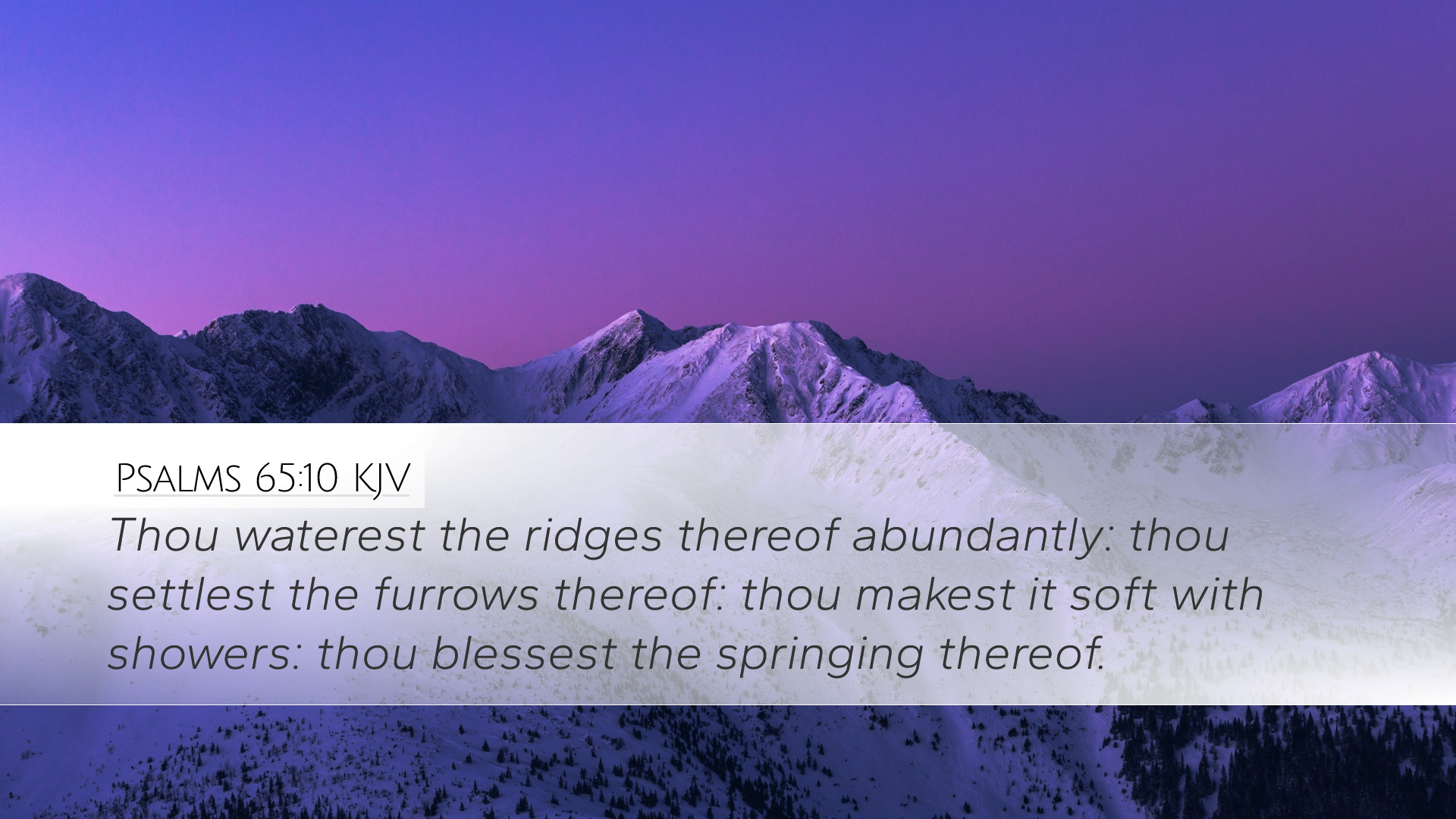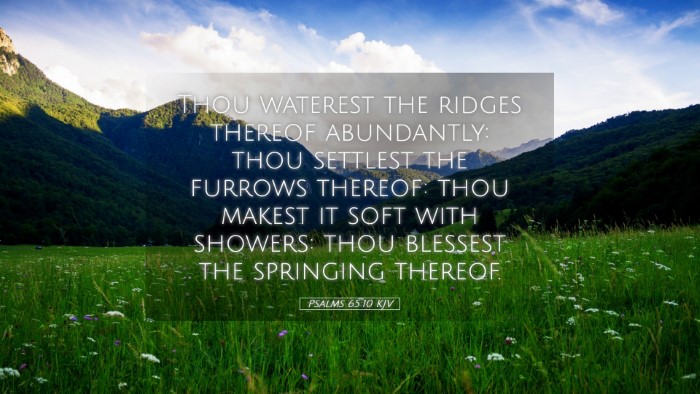Commentary on Psalms 65:10
Psalms 65:10 states: "You water its furrows abundantly, settling its ridges; you soften it with showers and bless its growth." This verse invokes a powerful imagery of God's providential care and grace as manifested in nature. Below, we will explore insights from Matthew Henry, Albert Barnes, and Adam Clarke as they expound on the meanings and implications of this passage.
Divine Provisions
Matthew Henry highlights the significance of divine provisions in the context of nature, interpreting the watering of the ground as a metaphor for God's continual sustenance. He notes that just as the farmer relies on rain for his crops, believers depend on God for their spiritual nourishment.
- Abundance in Provision: Henry emphasizes that God's provision is not merely sufficient but abundant. The phrase "water its furrows abundantly" signifies God's generosity in providing what is necessary for growth.
- Spiritual Implication: The physical act of watering the earth is paralleled by God’s spiritual sustenance, affirming that He nourishes His people in much the same way.
Symbolism of Water
Albert Barnes delves deeper into the symbolism of water. He describes water as an emblem of life and fertility, which is essential for the flourishing of all creation.
- Symbol of Grace: Barnes associates the watering of the earth with God's grace. He observes that just as the earth is revived by water, so are believers revived by God's grace through the Holy Spirit.
- Richness of Blessings: The phrase "soften it with showers" indicates not just physical rain, but spiritual refreshment that allows believers to grow in their faith.
Theological Insights
Adam Clarke provides a more theological perspective, linking this verse to themes of creation, providence, and the response of human beings to divine blessings. His commentary emphasizes the relationship between God, nature, and humanity.
- Divine Order: Clarke notes that this verse showcases God’s sovereignty over nature, affirming that He orchestrates the natural processes that allow for growth and fruitfulness.
- Human Response: There is an implied response from humanity to honor and praise God for these provisions. Clarke urges readers to consider how they can reflect gratitude and stewardship over the blessings they receive.
The Context of Praise
In the broader context of Psalm 65, we see that this verse is part of a hymn of praise that addresses God's overarching control over creation and the cosmic order. The psalmist calls not only for individual reflection but also for communal acknowledgment of God's works.
- Community and Creation: The cultivation theme extends beyond individual blessing to a corporate understanding of God's provision for all of creation. The nourishing of the land can be seen as a metaphor for the collective spiritual health of the community.
- Praise as a Response: The psalmist transitions from recognizing God’s provision to a call for praise, highlighting that when we see the blessings in our lives, it should naturally lead us to worship.
Application for Today
The insights garnered from this passage—and its associated commentaries—invite pastors, theologians, and students of the Bible to consider how they can apply these truths in their lives and ministries today.
- Gratitude in Ministry: Reflecting on God’s abundant provisions informs how pastors approach their congregations, guiding them to lead churches in acknowledgment of God’s continuous work.
- Encouragement in Trials: The acknowledgment of God’s care through seasons of drought in the spiritual life can offer comfort and motivation to those struggling to see growth amid difficulty.
- Stewardship of Creation: Understanding the nurturing aspect of God’s relationship with creation can prompt a commitment to environmental stewardship, recognizing our role as caretakers of God’s gifts.
Conclusion
Psalms 65:10 is a reminder of the profound relationship between the Creator and creation. The insights from Matthew Henry, Albert Barnes, and Adam Clarke collectively deepen our understanding of this verse, emphasizing themes of divine provision, grace, and the call to praise. May this reflection encourage an attitude of gratitude and stewardship as we witness the beauty of God’s work in both nature and the spiritual realm.


